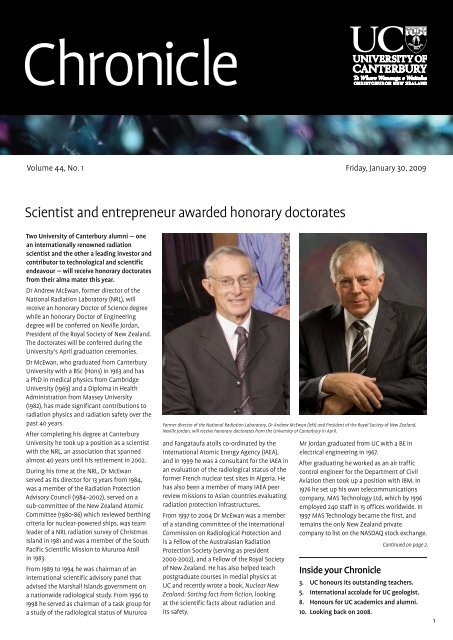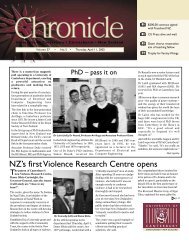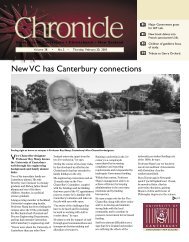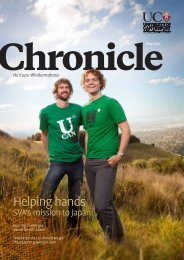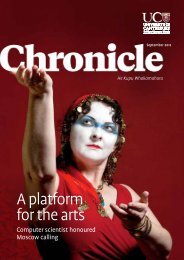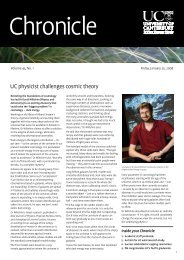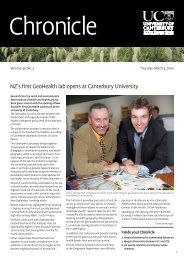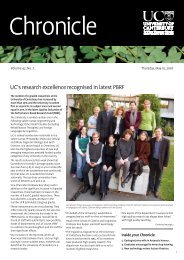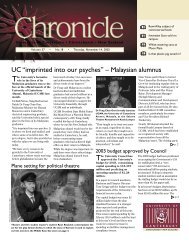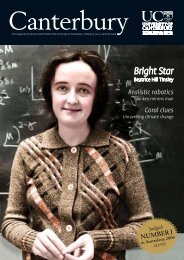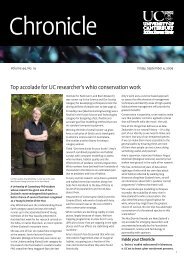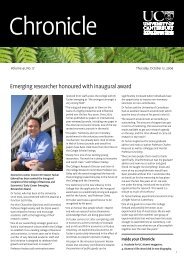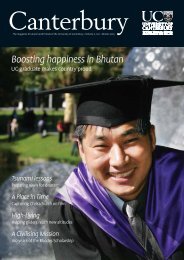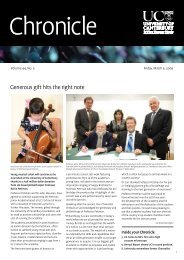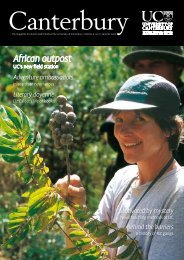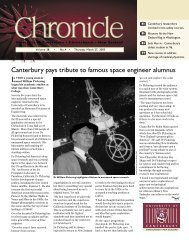No 1 - 30 January 2009 - Communications - University of Canterbury
No 1 - 30 January 2009 - Communications - University of Canterbury
No 1 - 30 January 2009 - Communications - University of Canterbury
Create successful ePaper yourself
Turn your PDF publications into a flip-book with our unique Google optimized e-Paper software.
Chronicle<br />
Volume 44, <strong>No</strong>. 1 Friday, <strong>January</strong> <strong>30</strong>, <strong>2009</strong><br />
Scientist and entrepreneur awarded honorary doctorates<br />
Two <strong>University</strong> <strong>of</strong> <strong>Canterbury</strong> alumni — one<br />
an internationally renowned radiation<br />
scientist and the other a leading investor and<br />
contributor to technological and scientific<br />
endeavour — will receive honorary doctorates<br />
from their alma mater this year.<br />
Dr Andrew McEwan, former director <strong>of</strong> the<br />
National Radiation Laboratory (NRL), will<br />
receive an honorary Doctor <strong>of</strong> Science degree<br />
while an honorary Doctor <strong>of</strong> Engineering<br />
degree will be conferred on Neville Jordan,<br />
President <strong>of</strong> the Royal Society <strong>of</strong> New Zealand.<br />
The doctorates will be conferred during the<br />
<strong>University</strong>’s April graduation ceremonies.<br />
Dr McEwan, who graduated from <strong>Canterbury</strong><br />
<strong>University</strong> with a BSc (Hons) in 1963 and has<br />
a PhD in medical physics from Cambridge<br />
<strong>University</strong> (1969) and a Diploma in Health<br />
Administration from Massey <strong>University</strong><br />
(1982), has made significant contributions to<br />
radiation physics and radiation safety over the<br />
past 40 years.<br />
After completing his degree at <strong>Canterbury</strong><br />
<strong>University</strong> he took up a position as a scientist<br />
with the NRL, an association that spanned<br />
almost 40 years until his retirement in 2002.<br />
During his time at the NRL, Dr McEwan<br />
served as its director for 13 years from 1984,<br />
was a member <strong>of</strong> the Radiation Protection<br />
Advisory Council (1984–2002), served on a<br />
sub-committee <strong>of</strong> the New Zealand Atomic<br />
Committee (1980-86) which reviewed berthing<br />
criteria for nuclear-powered ships, was team<br />
leader <strong>of</strong> a NRL radiation survey <strong>of</strong> Christmas<br />
Island in 1981 and was a member <strong>of</strong> the South<br />
Pacific Scientific Mission to Mururoa Atoll<br />
in 1983.<br />
From 1989 to 1994 he was chairman <strong>of</strong> an<br />
international scientific advisory panel that<br />
advised the Marshall Islands government on<br />
a nationwide radiological study. From 1996 to<br />
1998 he served as chairman <strong>of</strong> a task group for<br />
a study <strong>of</strong> the radiological status <strong>of</strong> Mururoa<br />
Former director <strong>of</strong> the National Radiation Laboratory, Dr Andrew McEwan (left) and President <strong>of</strong> the Royal Society <strong>of</strong> New Zealand,<br />
Neville Jordan, will receive honorary doctorates from the <strong>University</strong> <strong>of</strong> <strong>Canterbury</strong> in April.<br />
and Fangataufa atolls co-ordinated by the<br />
International Atomic Energy Agency (IAEA),<br />
and in 1999 he was a consultant for the IAEA in<br />
an evaluation <strong>of</strong> the radiological status <strong>of</strong> the<br />
former French nuclear test sites in Algeria. He<br />
has also been a member <strong>of</strong> many IAEA peer<br />
review missions to Asian countries evaluating<br />
radiation protection infrastructures.<br />
From 1997 to 2004 Dr McEwan was a member<br />
<strong>of</strong> a standing committee <strong>of</strong> the International<br />
Commission on Radiological Protection and<br />
is a Fellow <strong>of</strong> the Australasian Radiation<br />
Protection Society (serving as president<br />
2000-2002), and a Fellow <strong>of</strong> the Royal Society<br />
<strong>of</strong> New Zealand. He has also helped teach<br />
postgraduate courses in medial physics at<br />
UC and recently wrote a book, Nuclear New<br />
Zealand: Sorting fact from fiction, looking<br />
at the scientific facts about radiation and<br />
its safety.<br />
Mr Jordan graduated from UC with a BE in<br />
electrical engineering in 1967.<br />
After graduating he worked as an air traffic<br />
control engineer for the Department <strong>of</strong> Civil<br />
Aviation then took up a position with IBM. In<br />
1976 he set up his own telecommunications<br />
company, MAS Technology Ltd, which by 1996<br />
employed 240 staff in 15 <strong>of</strong>fices worldwide. In<br />
1997 MAS Technology became the first, and<br />
remains the only New Zealand private<br />
company to list on the NASDAQ stock exchange.<br />
Inside your Chronicle<br />
Continued on page 2.<br />
3. UC honours its outstanding teachers.<br />
5. International accolade for UC geologist.<br />
8. Honours for UC academics and alumni.<br />
10. Looking back on 2008.<br />
1
2<br />
Cherry Heremahoe (Here) Wilson (Ngai Tuhoe,<br />
Ngati Porou, Ngati Awa) died in Christchurch<br />
on 14 December, aged 64.<br />
Here had performed as a kaikaranga for<br />
the <strong>University</strong> <strong>of</strong> <strong>Canterbury</strong> for more than<br />
20 years, most recently at the graduation<br />
ceremonies in April 2008. Throughout her long<br />
association with the <strong>University</strong> Here had been<br />
a mentor and great supporter <strong>of</strong> many staff<br />
and students.<br />
Here (DipMaorLang, New Zealand Diploma in<br />
Specialist Subjects) was a native speaker <strong>of</strong><br />
Chronicle<br />
Next Issue: 20 February <strong>2009</strong><br />
Deadline: 13 February <strong>2009</strong><br />
Editor: Stacey Doonerbal<br />
364 2984<br />
Staff Writers: Jeanette Colman<br />
Maria De Cort<br />
Jane Lucas<br />
John MacDonald<br />
Sub-editor: Col Pearson<br />
Photos: Duncan Shaw-Brown<br />
Eve Welch<br />
Artwork: Michele Leeming<br />
Printer: Xpress Printing House<br />
www.xpressprinting.co.nz<br />
Distribution: <strong>Canterbury</strong> Educational<br />
Printing Services<br />
E-mail: comms@canterbury.ac.nz<br />
Fax: Ext 6679 or 364 2679<br />
Address: <strong>Communications</strong> and<br />
Development,<br />
<strong>University</strong> <strong>of</strong> <strong>Canterbury</strong>,<br />
Private Bag 4800,<br />
Christchurch.<br />
Cherry Heremahoe (Here) Wilson 1944-2008<br />
Mäori, born among the Ngati Tawhaki hapu<br />
<strong>of</strong> Ngai Tuhoe at Ruatoki in the Bay <strong>of</strong> Plenty.<br />
Brought up in the Ringatu faith <strong>of</strong> her elders,<br />
Here was well versed in tikanga Mäori and<br />
culturally literate in all aspects <strong>of</strong> her own<br />
world, as well as the wider society in which<br />
she found her home. She provided invaluable<br />
linguistic and cultural support to staff and<br />
students <strong>of</strong> the <strong>University</strong> <strong>of</strong> <strong>Canterbury</strong> and,<br />
in particular, the Mäori Students Association,<br />
Te Akatoki.<br />
Here was also a member <strong>of</strong> Te Hepara Pai, the<br />
Anglican Mäori Mission, and had recently been<br />
installed as a lay canon. She was a prominent<br />
figure when the 1998 Hikoi <strong>of</strong> Hope, a march<br />
for social justice, reached Cathedral Square<br />
in Christchurch, responding to the karanga<br />
from the Cathedral steps. Here had a strong<br />
commitment to issues <strong>of</strong> equality and was a<br />
truly bicultural citizen.<br />
She was active in sports in her youth and as<br />
a young mother, especially netball. She was<br />
an ardent supporter, and at times a fierce<br />
UC leads the way in teaching supercomputing<br />
The <strong>University</strong> <strong>of</strong> <strong>Canterbury</strong>, the first<br />
institution in the southern hemisphere to<br />
have an IBM Blue Gene supercomputer, is<br />
to become the first tertiary institution<br />
in Australasia to teach high-performance<br />
computing.<br />
Four new courses this year will teach students<br />
how to use the latest technology in parallel<br />
computing and state-<strong>of</strong>-the-art computing<br />
architectures. Ten scholarships (eight domestic,<br />
two international) funded by the <strong>University</strong><br />
and IBM will be available for students taking<br />
the courses.<br />
“This development shows UC to be at the<br />
forefront <strong>of</strong> high-performance computing in<br />
New Zealand and reflects our recognition that<br />
21st century students need 21st century skills,”<br />
said Pr<strong>of</strong>essor Tim David, Director <strong>of</strong> the Centre<br />
In 1999 Mr Jordan founded private equity<br />
company Endeavour Capital Ltd which<br />
provides investment capital to science and<br />
technology companies, and has since gone on<br />
to establish numerous science, engineering<br />
and technology-based companies.<br />
Mr Jordan has served on several ministerial<br />
science and technology committees and<br />
has been on the board <strong>of</strong> AgResearch (1993-<br />
1998), the Foundation for Research, Science<br />
and Technology (1999-2001) and the Prime<br />
Minister’s Growth and Innovation Advisory<br />
Board (2002-2005). Currently President <strong>of</strong> the<br />
Royal Society <strong>of</strong> New Zealand, he was recently<br />
appointed Chair <strong>of</strong> the National Information<br />
critic <strong>of</strong> the Silver Ferns, the All Blacks and the<br />
Auckland Warriors.<br />
Whaea Here was a familiar sight at campus<br />
functions and was well known for her stylish<br />
dress sense, and her forthright and honest<br />
relationships. Whether it was correcting a<br />
student’s poor pronunciation, use <strong>of</strong> the<br />
wrong personal pronoun, or supporting<br />
doctoral students as whanau in the midst <strong>of</strong><br />
a viva, for such a tiny figure, Here Wilson had<br />
a larger-than-life presence in the <strong>University</strong><br />
culture.<br />
Three <strong>University</strong> staff — Dr Jeanette King,<br />
Nichole Gully and Dr Jeffrey Paparoa Holman —<br />
were among the funeral party which travelled<br />
north to return Here to her marae, Ngahina, at<br />
Ruatoki.<br />
Haere atu e whae ki te okiokinga o o tupuna, ki<br />
te taha o to ariki, Ihu Karaiti.<br />
Dr Jeanette King<br />
School <strong>of</strong> Languages Cultures and Linguistics<br />
for Bioengineering, in the Department <strong>of</strong><br />
Mechanical Engineering.<br />
“<strong>Canterbury</strong> will be the only university in the<br />
country to have high-performance computing<br />
in its curriculum.”<br />
The courses will be taught by Paul Walmsley,<br />
an acknowledged expert in the field, and an<br />
adjunct senior fellow at UC.<br />
They will provide students with an<br />
understanding <strong>of</strong> the different types <strong>of</strong><br />
parallel computer architectures that are used<br />
in computational science and engineering<br />
disciplines to solve complex problems.<br />
They will also introduce students to grid<br />
computing, a phenomenon becoming more<br />
widely used in scientific computing.<br />
Scientist and entrepreneur awarded honorary doctorates continued from page 1.<br />
and <strong>Communications</strong> Technology Australia<br />
(NICTA) Review Panel by the Australian<br />
Government.<br />
He is also a laureate <strong>of</strong> both the New Zealand<br />
Business Hall <strong>of</strong> Fame and the Hi-Tech Hall<br />
<strong>of</strong> Fame.<br />
A Distinguished Fellow <strong>of</strong> the Institute <strong>of</strong><br />
Pr<strong>of</strong>essional Engineers NZ, in 1997 Mr Jordan<br />
received the Governor General’s Supreme<br />
Award for Exporting. In 1998 he was awarded<br />
the United Kingdom Institution <strong>of</strong> Electrical<br />
Engineers (IEE) Kirby Medal and the following<br />
year became a Companion <strong>of</strong> the New Zealand<br />
Order <strong>of</strong> Merit (CNZM).
UC honours its outstanding teachers<br />
Dr Alex James.<br />
Pr<strong>of</strong>essor Bill Davison. Pr<strong>of</strong>essor Eric Pawson.<br />
Dr Gareth Pritchard. Gina Haines.<br />
Associate Pr<strong>of</strong>essor Lucy Johnston.<br />
Teaching excellence at the <strong>University</strong> <strong>of</strong><br />
<strong>Canterbury</strong> has been recognised with the<br />
announcement <strong>of</strong> the 2008 <strong>University</strong><br />
Teaching Awards.<br />
Seven awards will be presented to staff at<br />
this April’s graduation in recognition <strong>of</strong> their<br />
outstanding teaching achievements. The<br />
recipients are: Pr<strong>of</strong>essor Bill Davison (Biological<br />
Sciences); Richard Fisher (Accounting and<br />
Information Systems); Gina Haines (Literacies<br />
and Arts in Education); Dr Alex James<br />
(Mathematics and Statistics); Associate<br />
Pr<strong>of</strong>essor Lucy Johnston (Psychology);<br />
Pr<strong>of</strong>essor Eric Pawson (Geography); and Dr<br />
Gareth Pritchard (History).<br />
Richard Fisher.<br />
Assistant Vice-Chancellor (Academic) Dr Jan<br />
Cameron said the <strong>University</strong> Teaching Awards<br />
were awarded annually to staff rated as<br />
outstanding teachers.<br />
“The awards recognise excellence in various<br />
aspects <strong>of</strong> teaching, including innovative<br />
practice, application <strong>of</strong> research-informed<br />
pedagogy, curriculum development,<br />
outstanding thesis supervision and overall<br />
contributions to teaching in the discipline.<br />
“The winners <strong>of</strong> these awards are recognised<br />
by both their colleagues and their students<br />
as consistently providing ‘something extra’ in<br />
their teaching. They are educational leaders<br />
within the <strong>University</strong>.”<br />
New look for College <strong>of</strong> Arts<br />
The College <strong>of</strong> Arts has taken on a new look<br />
for the New Year.<br />
The programmes within its schools have been<br />
reorganised into six rather than 11 schools.<br />
The new schools are: the School <strong>of</strong> Languages,<br />
Cultures and Linguistics; the School <strong>of</strong><br />
Humanities; the Centre for Fine Arts, Music<br />
and Theatre; and the School <strong>of</strong> Social and<br />
Political Sciences.<br />
The School <strong>of</strong> Languages, Cultures and<br />
Linguistics now comprises the Arabic, Chinese,<br />
French, German, Japanese, Russian, Spanish,<br />
European Languages and Cultures, and<br />
Linguistics programmes.<br />
The School <strong>of</strong> Humanities consists <strong>of</strong> American<br />
Studies, Art History and Theory, Classics,<br />
Cultural Studies, English, History, Philosophy,<br />
and Film Studies, while the School <strong>of</strong> Social<br />
and Political Sciences contains Anthropology,<br />
Gender Studies, Mass Communication and<br />
Journalism, Political Science, Religious Studies,<br />
and Sociology.<br />
The Centre for Fine Arts, Music and Theatre,<br />
which has a newly appointed Director, Amanda<br />
Morris, encompasses the disciplines <strong>of</strong> fine<br />
arts, music and theatre and film studies.<br />
The School <strong>of</strong> Social Work and Human<br />
Services and Aotahi: The School <strong>of</strong> Mäori and<br />
Indigenous Studies remain unchanged. The<br />
College also embraces the Macmillan Brown<br />
Centre for Pacific Studies.<br />
Pro-Vice-Chancellor (Arts) Pr<strong>of</strong>essor Ken<br />
Strongman said the reorganisation was the<br />
culmination <strong>of</strong> the Arts Future Project which<br />
included a full review <strong>of</strong> the BA degree and<br />
analysis <strong>of</strong> the academic, managerial and<br />
financial aspects <strong>of</strong> the College.<br />
He said the aim <strong>of</strong> the new structure was to<br />
streamline management through a smaller<br />
advisory committee consisting <strong>of</strong> the Pro-Vice-<br />
Chancellor, Deans and Heads <strong>of</strong> School.<br />
“Another important aspect <strong>of</strong> this is that no<br />
programme or discipline has been lost in this<br />
reorganisation. They have been rearranged and<br />
moved but no programme has been dropped.”<br />
3
4<br />
Emeritus Pr<strong>of</strong>essor Walt Jones died on<br />
8 December.<br />
He arrived at the <strong>University</strong> <strong>of</strong> <strong>Canterbury</strong> in<br />
1972 to take up his appointment as Chair in<br />
Atmospheric Physics, as the third pr<strong>of</strong>essor in<br />
the Department <strong>of</strong> Physics and Astronomy. He<br />
retired in June 1992.<br />
Walt was born in Chicago and went to high<br />
school there and in Massachusetts. He<br />
completed a BE in electrical engineering<br />
at Cornell <strong>University</strong> and began work as a<br />
research engineer with DuPont. After five years<br />
at DuPont he enrolled for a PhD in physics at<br />
the Massachusetts Institute <strong>of</strong> Technology.<br />
During a seminar given by a pr<strong>of</strong>essor <strong>of</strong><br />
meteorology he discovered that “there was<br />
some good old-fashioned classical physics in<br />
the atmosphere”.<br />
He finished his PhD in upper atmosphere<br />
physics in 1963 and went to work for the<br />
National Center for Atmospheric Research in<br />
Boulder, Colorado (NCAR), concentrating on<br />
wave motions in the atmosphere, particularly<br />
the tides, and acoustic and internal gravity<br />
waves in the upper atmosphere. He became<br />
internationally known for the high quality <strong>of</strong><br />
his research, exemplified by his contribution<br />
on “Linear Internal Gravity Waves in the<br />
Atmosphere” to Handbuch der Physik in 1976.<br />
He had been working for NCAR for nine years<br />
when a colleague pointed out a <strong>University</strong><br />
<strong>of</strong> <strong>Canterbury</strong> advertisement for a Chair in<br />
A <strong>University</strong> <strong>of</strong> <strong>Canterbury</strong> course examining<br />
the representation <strong>of</strong> animals and humananimal<br />
relations in American popular culture<br />
has received a distinguished award from the<br />
Humane Society <strong>of</strong> the United States (HSUS).<br />
From Bambi to Kong (CULT206/AMST236/<br />
Emeritus Pr<strong>of</strong>essor Walt Jones 1932-2008<br />
Atmospheric Physics. Walt applied and was<br />
appointed. In 1972 he began his teaching<br />
and research at <strong>Canterbury</strong>, continuing his<br />
investigations into upper atmospheric waves,<br />
and examining non-linear wave phenomena<br />
and their conservation properties. He also<br />
supervised research into aspects <strong>of</strong> nonlinear<br />
flows in water, in association with<br />
the Department <strong>of</strong> Civil Engineering, and<br />
<strong>of</strong> various problems in planetary and stellar<br />
formation in association with astronomers.<br />
He showed his enthusiasm for the subjects<br />
on which he lectured and was constantly<br />
looking for novel and more effective ways <strong>of</strong><br />
presenting the material. He introduced a trial<br />
<strong>of</strong> a module style course at 200-level which<br />
proved to be very work intensive for both<br />
students and lecturer.<br />
US honour for <strong>Canterbury</strong> human-animal relationship course<br />
GEND213), taught by Dr Annie Potts (Culture,<br />
Literature and Society), received the 2008<br />
Distinguished Established Course Award.<br />
The awards, now in their 10th year, recognise<br />
academic excellence in college and university<br />
courses that explore the relationships between<br />
animals and people.<br />
HSUS said the <strong>Canterbury</strong> course was<br />
well-conceptualised in how it explored the<br />
representations <strong>of</strong> animals in popular culture.<br />
“In just a few years, the course has helped to<br />
establish the field <strong>of</strong> human-animal studies at<br />
the <strong>University</strong>, facilitated the formation <strong>of</strong> an<br />
animal studies network in New Zealand and<br />
produced a high number <strong>of</strong> students interested<br />
in pursuing further research in this area.”<br />
Dr Potts, who has been teaching the course<br />
for five years, said she was delighted with the<br />
award and US$1500 prize money.<br />
“This course is a team effort. It also involves<br />
lectures from Philip Armstrong in English, and<br />
tutor Kate Yeoman has been the backbone <strong>of</strong><br />
the course since its inception. From Bambi to<br />
Kong motivates students to be more aware <strong>of</strong><br />
critical issues relating to nonhuman animals<br />
and society. And we’ve found that students are<br />
more receptive to considering, discussing and<br />
One <strong>of</strong> his former students, now a staff<br />
member, recollects from his undergraduate<br />
years: “My enduring recollection <strong>of</strong> Walt is<br />
<strong>of</strong> one <strong>of</strong> those rare people who freely gave<br />
his full attention. On entering his <strong>of</strong>fice you<br />
were greeted with that warm smile, and that<br />
towering frame, and you knew that for the<br />
next few minutes you were the centre <strong>of</strong> his<br />
attention”.<br />
In later years he became more involved with<br />
the administration <strong>of</strong> the <strong>University</strong>. He<br />
was Dean <strong>of</strong> the Science Faculty and then<br />
served two terms on the Academic Staffing<br />
Committee in the 1980s. In 1987 he was<br />
appointed Deputy Chairman <strong>of</strong> the Academic<br />
Administration Committee and became<br />
chairman <strong>of</strong> that committee in 1989, an<br />
appointment which he held until the day he<br />
retired.<br />
He represented the <strong>University</strong> on the Committee<br />
for <strong>University</strong> Academic Programmes and on<br />
sub-committees for <strong>University</strong> Entrance<br />
standards and for consultation with NZQA.<br />
Walt is survived by his wife, Carlie, and their<br />
children, Connie, Scott and Shannon, and<br />
six grandchildren.<br />
Dr Grahame Fraser<br />
Physics and Astronomy<br />
debating the more controversial or provocative<br />
relationships humans have with animals if they<br />
are first exposed to representations <strong>of</strong> these<br />
within film or fiction.<br />
“Also, because this is an interdisciplinary course,<br />
it attracts students from Arts, Law, Science and<br />
Commerce faculties. Everyone’s life involves<br />
relationships with animals in one form or<br />
another.”<br />
From Bambi to Kong covers a range <strong>of</strong> topics<br />
including the representation <strong>of</strong> human-animal<br />
relationships in cinema and television; images<br />
<strong>of</strong> whales in literature, the environmental<br />
movement and eco-tourism; dinosaur<br />
iconography; and cultural practices such as<br />
hunting, pet-keeping, factory farming and zoos.<br />
Adjunct appointments<br />
Dr Jamie Pearce has been appointed adjunct<br />
associate pr<strong>of</strong>essor in the Department <strong>of</strong><br />
Geography and Graeme Dunstall has been<br />
appointed adjunct senior fellow in the<br />
Department <strong>of</strong> History.<br />
The appointments are for a three-year term.
International accolade for UC geologist<br />
UC geologist Pr<strong>of</strong>essor Jim Cole has received<br />
an international honour for his work in the<br />
area <strong>of</strong> emergency management.<br />
The International Association <strong>of</strong> Emergency<br />
Managers (IAEM) has awarded Pr<strong>of</strong>essor Cole<br />
with the 2008 Academic Recognition Award<br />
for his “significant contributions to the formal<br />
education <strong>of</strong> students pursuing careers in<br />
emergency management”.<br />
The association also recognised Pr<strong>of</strong>essor Cole<br />
for his outstanding research career, which<br />
includes programmes that discovered new<br />
volcanic centres. In the citation, the IAEM said<br />
Pr<strong>of</strong>essor Cole had “significantly increased<br />
our understanding <strong>of</strong> what triggers supereruptions<br />
from highly active volcanic centres<br />
in the Taupo Volcanic Zone, New Zealand, and<br />
around the world”.<br />
Pr<strong>of</strong>essor Cole, who is Director <strong>of</strong> the<br />
<strong>University</strong> <strong>of</strong> <strong>Canterbury</strong>’s Natural Hazards<br />
Research Centre (NHRC), said he was “taken by<br />
surprise” by the award. A new student chapter<br />
<strong>of</strong> the IAEM was set up at the <strong>University</strong><br />
in April, with Civil and Natural Resources<br />
Segway rides for charity<br />
UC staff and students zipped around the<br />
science lecture block quad on Segways last<br />
Friday in the name <strong>of</strong> charity.<br />
The fundraiser, organised by UC Facilities<br />
Management staff and supported by Graeme<br />
Gordon from Urban Wheels, was held to raise<br />
money for the Cancer Society’s Relay for Life,<br />
a 24-hour overnight team relay which will be<br />
held at the Christchurch showgrounds on 28<br />
February -1 March.<br />
Engineering PhD student Amy Stephenson<br />
as president.<br />
“Totally unbeknown to me, Amy, together<br />
with a group <strong>of</strong> PhD students from the NHRC,<br />
in particular Tom Wilson, Ali Bazgard, Scott<br />
Barnard and Dean Podolsky, put my name<br />
forward for nomination for the award in the<br />
middle <strong>of</strong> the year. They were assisted by<br />
the Vice President <strong>of</strong> the Oceania Council<br />
<strong>of</strong> IAEM, Kristin Hoskin, who is based in<br />
Christchurch and is an associate <strong>of</strong> NHRC, and<br />
supported by Pr<strong>of</strong>essor Jarg Pettinga, Head <strong>of</strong><br />
the Department <strong>of</strong> Geological Sciences, and<br />
Associate Pr<strong>of</strong>essor Tim Davies, Co-ordinator<br />
<strong>of</strong> the Hazard and Disaster Management<br />
programmes at the <strong>University</strong> <strong>of</strong> <strong>Canterbury</strong>.”<br />
Pr<strong>of</strong>essor Cole said he “felt very honoured” by<br />
the award.<br />
“The award equally recognises the <strong>University</strong><br />
<strong>of</strong> <strong>Canterbury</strong>, its Natural Hazard Research<br />
Centre and the courses run in Hazard and<br />
Disaster Management. Interestingly since<br />
the award was announced there has been<br />
a significant increase in the number <strong>of</strong><br />
Mail services supervisor Peter Nicolson said<br />
that as people were always asking mailroom<br />
and security staff if they could have a ride<br />
on the <strong>University</strong>’s Segways charging a gold<br />
coin for a ride seemed like a great idea for a<br />
fundraiser. The lunchtime event, which was<br />
the second held in recent months, was well<br />
supported by staff and postgraduate students<br />
from throughout campus.<br />
(From left) Arthur Dredge (Security) Steve Harrison and Paul Chapman (Planning, Information and Reporting Unit) and John Botha<br />
(Security) putting the fun into fundraising.<br />
Pr<strong>of</strong>essor Jim Cole.<br />
international students asking for information<br />
about postgraduate courses here in hazard and<br />
disaster management.”<br />
UC welcomes new staff<br />
Dr Catherine Bishop<br />
has been appointed<br />
Senior Lecturer in<br />
Computational<br />
Materials Science in the<br />
Mechanical Engineering<br />
Department. Dr Bishop<br />
has a BS (Hons) from<br />
Carnegie Mellon<br />
<strong>University</strong> in Pittsburgh, USA, and a PhD in<br />
material sciences from the Massachusetts<br />
Institute <strong>of</strong> Technology in Cambridge, USA.<br />
Prior to joining UC, Dr Bishop was a career<br />
development fellow in the Department <strong>of</strong><br />
Materials, <strong>University</strong> <strong>of</strong> Oxford, UK. While at<br />
Oxford, Dr Bishop was developing general<br />
diffuse-interface theory for grain boundaries<br />
in multi-component materials and to explore<br />
interfacial transitions in ceramics.<br />
Susan Wild has been<br />
appointed Lecturer<br />
in Accounting in<br />
the Department<br />
<strong>of</strong> Accounting and<br />
Information Systems.<br />
Ms Wild has a BA<br />
(Hons) from Victoria<br />
<strong>University</strong> <strong>of</strong> Wellington<br />
(VUW) and is currently<br />
studying part-time towards a PhD at VUW.<br />
Prior to taking up her position at UC, Ms Wild<br />
was a lecturer in accounting in the Faculty <strong>of</strong><br />
Business and Informatics, Central Queensland<br />
<strong>University</strong>/NZIC (New Zealand International<br />
Campus), Heretaunga.<br />
5
6<br />
VC designate addresses UC’s December graduation ceremonies<br />
<strong>Canterbury</strong> <strong>University</strong>’s Vice-Chancellor<br />
designate, Dr Rod Carr, and former vicechancellor<br />
Dr Roy Sharp, addressed<br />
graduates during the <strong>University</strong>’s graduation<br />
ceremonies in December.<br />
In three ceremonies held at the Christchurch<br />
Town Hall on 17 and 19 December, 1106<br />
students received their degrees, diplomas<br />
and certificates in person while a further 432<br />
graduated in absentia.<br />
The ceremonies followed a graduation<br />
ceremony held in Rotorua on 10 December<br />
for Education students at which 72 graduates<br />
received their degrees and diplomas.<br />
Highlights <strong>of</strong> the week included the<br />
presentation <strong>of</strong> the <strong>University</strong> <strong>of</strong> <strong>Canterbury</strong><br />
Research Medal to Pr<strong>of</strong>essor Peter Steel<br />
(Chemistry) and the <strong>Canterbury</strong> <strong>University</strong><br />
Teaching Medal to Associate Pr<strong>of</strong>essor<br />
Roger <strong>No</strong>kes (Civil and Natural Resources<br />
Engineering).<br />
Graduates were congratulated on their<br />
achievement by Chancellor Dr Robin<br />
Mann, who presided over his last capping<br />
ceremonies in the role. Wednesday afternoon’s<br />
graduates were addressed by Dr Sharp, now<br />
Chief Executive <strong>of</strong> the Tertiary Education<br />
Commission, with Pro-Vice-Chancellor<br />
(Education) Pr<strong>of</strong>essor Gail Gillon delivering the<br />
morning’s address. Dr Carr, who takes up his<br />
position as Vice-Chancellor at UC in February,<br />
spoke at the Friday morning ceremony.<br />
Dr Carr reflected on the age-old question,<br />
“what do you want to do when you grow up?”<br />
before posing the question, “what do you want<br />
to be as you grow up?” to graduates.<br />
Dr Carr said we all possessed the power to<br />
choose and it was a never-ending process.<br />
Pr<strong>of</strong>essor Peter Steel (right) receives the <strong>University</strong> <strong>of</strong> <strong>Canterbury</strong><br />
Research Medal from Chancellor Dr Robin Mann.<br />
Pro-Vice-Chancellor (Education) Pr<strong>of</strong>essor Gail Gillon addresses graduates.<br />
“As you grow up, make choices, for you have<br />
the power to choose. Choose what you want<br />
to do, what you want to be known for, the<br />
people you want to associate with, and the<br />
mentors you want to hold in your life — these<br />
are all your choices,” he said.<br />
He spoke about the important connection<br />
all those graduating shared — a common<br />
moment in their community, and noted<br />
that it was a moment over time they shared<br />
with “a rather notorious graduate, Lord<br />
Ernest Rutherford”.<br />
Dr Carr said the portrait <strong>of</strong> Rutherford which<br />
graced the New Zealand $100 note was<br />
recognition the UC alumnus was a man<br />
“renowned for a curious mind, the discipline,<br />
the courage and the pursuit <strong>of</strong><br />
new knowledge”.<br />
“If there was one thing that I would hope<br />
that you take from our moment shared<br />
it is that simple test as you grow up: Am I<br />
exercising my curious mind? Am I applying the<br />
disciplines I have been taught, and do I have<br />
the courage to stand up for what I believe I<br />
know I have found? And if you take from this<br />
community those traits then you will truly<br />
be a contributing member <strong>of</strong> your society<br />
and a proud graduate <strong>of</strong> the <strong>University</strong> <strong>of</strong><br />
<strong>Canterbury</strong>.”<br />
As was fitting for the 100th anniversary <strong>of</strong><br />
Rutherford receiving the <strong>No</strong>bel Prize for<br />
Chemistry, Dr Sharp also drew on the example<br />
<strong>of</strong> the famous scientist. He referred to<br />
Rutherford’s quote, “We don’t have the money,<br />
so we have to think”, telling graduates how<br />
relevant that statement was nowadays with<br />
financial, economic and environmental crises<br />
facing the globe.<br />
He echoed the comments <strong>of</strong> another famous<br />
New Zealand scientist, Sir Ernest Marsden,<br />
from 70 years ago, that “the greatest need <strong>of</strong><br />
our age is the production <strong>of</strong> inspired leaders”<br />
saying the statement was just as true today.<br />
“Your education at <strong>Canterbury</strong> has marked you<br />
out as a leader,” Dr Sharp told the new graduates.<br />
Pro-Vice-Chancellor (Education) Pr<strong>of</strong>essor<br />
Gail Gillon told education graduates at the<br />
Wednesday morning ceremony that they were<br />
in a powerful position to make a difference.<br />
“As our future educators and educational<br />
leaders, I call upon you today to embrace every<br />
teaching interaction, to actively engage and<br />
excite young children in learning, to support<br />
and encourage our youth and adult learners<br />
towards successful learning outcomes,”<br />
she said.<br />
Pr<strong>of</strong>essor Gillon said that while graduation<br />
marked the end <strong>of</strong> one part <strong>of</strong> a journey in<br />
each student’s educational pursuits, it was<br />
also a time to celebrate each graduate’s<br />
potential to make a difference.<br />
“We celebrate your potential to demonstrate<br />
excellence as educators and we celebrate the<br />
strengths and talents each <strong>of</strong> you now brings<br />
to advancing our global literate society.”<br />
Associate Pr<strong>of</strong>essor Roger <strong>No</strong>kes (right) receives the UC<br />
Teaching Medal.
Mexican journalism graduate bids UC farewell<br />
Tequila and guacamole were on the menu<br />
to give graduation celebrations a taste <strong>of</strong><br />
home for journalism graduate Laura Müller<br />
Rodriguez last month.<br />
Laura, from Chihuahua, Mexico, completed<br />
the Graduate Diploma in Journalism at the<br />
<strong>University</strong> <strong>of</strong> <strong>Canterbury</strong> in 2008 thanks to a<br />
Rotary Foundation Ambassadorial Scholarship.<br />
Laura secured one <strong>of</strong> the <strong>30</strong> worldwide<br />
scholarships the foundation awards annually<br />
to students from developing countries and<br />
said she felt very fortunate and grateful to<br />
Rotary for an “amazing life opportunity”.<br />
The one year UC Graduate Diploma in<br />
Journalism course is limited to 20 students<br />
who must be New Zealand citizens or<br />
permanent residents with provision for one<br />
additional student from a developing country.<br />
Laura was the first international student since<br />
1996 to complete the course.<br />
“Being in New Zealand and surviving the<br />
journalism programme has been the challenge<br />
<strong>of</strong> my life until now,” she said.<br />
Proudly watching on as Laura crossed the Town<br />
Hall stage to be capped on her graduation day<br />
were her host family, three local Rotarians<br />
she had grown close to during the year and,<br />
making it extra special, her two best friends<br />
from Mexico, who travelled to be at her<br />
graduation before whisking her away on a road<br />
trip to celebrate.<br />
“My friend Karen from Mexico brought me a<br />
huge bottle <strong>of</strong> tequila as a gift so my friends<br />
from the journalism class and my Mexican<br />
friends who came over met at my place to<br />
have some tequila shots and eat some real<br />
guacamole. It was amazing fun.”<br />
Laura, who has a Bachelor in Mass<br />
Communication from the Universidad<br />
Regional del <strong>No</strong>rte in Chihuahua, Mexico, and<br />
a Diploma in Travel and Tourism from the City<br />
<strong>University</strong> <strong>of</strong> New York (CUNY), said the biggest<br />
challenge <strong>of</strong> studying journalism in New<br />
Zealand was the language.<br />
“It was very hard for people to understand me<br />
when I arrived as people are not used to the<br />
Latin American accent here, so I lost a lot <strong>of</strong><br />
confidence at the beginning because I could<br />
not get people to understand me.”<br />
She also struggled at first to come to grips<br />
with the New Zealand accent and having<br />
studied in America was used to American<br />
grammar and had to “relearn” things “the Kiwi<br />
way”.<br />
Laura was able to share her experience with<br />
her compatriots back home through her<br />
syndicated Sunday column Ruleta Urbana<br />
(Urban Roulette), which is published by the<br />
Organizacion Editorial Mexicana (OEM), the<br />
largest print media organisation in Mexico, in<br />
seven newspapers in northern Mexico as well<br />
as online.<br />
Laura Müller Rodriguez tipping her trencher to her friends in the Town Hall on graduation day.<br />
“In Ruleta Urbana I write about everything<br />
that comes to my mind — in the same way as<br />
a roulette wheel can stop at any number or<br />
colour, my column can talk about any topic<br />
that comes to mind,” Laura said.<br />
“During my studies in New Zealand, I have<br />
written about your culture and the amazing<br />
places you have. The opportunity and<br />
experience <strong>of</strong> living in New Zealand has not<br />
UC celebrates graduation in Rotorua<br />
For the first <strong>of</strong> its four December graduation<br />
ceremonies, UC took to the road —<br />
destination scenic Rotorua — for the annual<br />
celebration <strong>of</strong> the College <strong>of</strong> Education’s<br />
distance students.<br />
Seventy-two graduands enrolled in the<br />
College’s Flexible Learning Option (FLO)<br />
programmes flocked with friends and whanau<br />
from around Rotorua, New Plymouth and<br />
Tauranga to be capped by Chancellor Dr Robin<br />
Mann at the Rotorua Convention Centre on 10<br />
December.<br />
Graduands, staff and guests were welcomed<br />
with a powhiri performed by Ken Keneti (Te<br />
Arawa), the Kaumatua representing local host<br />
Waiariki Institute <strong>of</strong> Technology — to which Te<br />
Hurinui Clarke (Ngai Tahu) (Mäori, Social and<br />
Cultural Studies) responded on behalf <strong>of</strong> the<br />
<strong>University</strong>. The ceremony was also colourfully<br />
enhanced with waiata performed by the<br />
graduating cohorts.<br />
Emphasising the importance <strong>of</strong> the<br />
multicultural theme was Dr Angus Hikairo<br />
Macfarlane, an associate pr<strong>of</strong>essor at the<br />
<strong>University</strong> <strong>of</strong> Waikato and 2008 Senior<br />
only been for me, but also for all my readers.”<br />
Although Laura said “adiós” to New Zealand<br />
earlier this month she said “this country and<br />
its people will stay in my heart forever”.<br />
Head <strong>of</strong> the School <strong>of</strong> Social and Political<br />
Sciences Associate Pr<strong>of</strong>essor Jim Tully said a<br />
reporter with an Ethiopian news agency was<br />
expected to join the <strong>2009</strong> class.<br />
Research Fellow at the UC College <strong>of</strong> Education,<br />
returning to his Te Arawa roots to give the<br />
graduation address.<br />
Dr Macfarlane spoke <strong>of</strong> the importance<br />
<strong>of</strong> “educultural” pathways to success. With<br />
the significant recent changes both in New<br />
Zealand and in the global context he said<br />
there was increasing need for intercultural<br />
knowledge and understanding.<br />
Dr Macfarlane said the keys to educultural<br />
success were the personal qualities <strong>of</strong><br />
boldness, curiosity, balance, scholarship,<br />
vision and humility — qualities the graduates<br />
had already begun to demonstrate through<br />
the academic achievements they were<br />
celebrating that day.<br />
Paying tribute to the hard work and dedication<br />
<strong>of</strong> their fellow students and the support<br />
<strong>of</strong> staff, family and friends, three <strong>of</strong> the<br />
graduating students also spoke: Joanna Young<br />
(Diploma in Teaching and Learning – Early<br />
Childhood), Nicolette Harrison (Bachelor <strong>of</strong><br />
Teaching and Learning – Primary) and Curtis<br />
Hemana (Graduate Diploma in Teaching and<br />
Learning – Secondary).<br />
7
8<br />
Former long-serving academic in <strong>Canterbury</strong><br />
<strong>University</strong>’s English Department, Emeritus<br />
Pr<strong>of</strong>essor Ray Copland, died on 8 <strong>January</strong> at<br />
the age <strong>of</strong> 90.<br />
Born in Feilding Ray, a <strong>Canterbury</strong> alumnus,<br />
survived the 1931 Napier earthquake. He also<br />
survived a wartime stint in the RNZAF as a<br />
navigator, where he alternated patrols over the<br />
<strong>No</strong>rth Atlantic with correspondence courses in<br />
French and English.<br />
Emeritus Pr<strong>of</strong>essor Raymond Copland 1918-<strong>2009</strong><br />
Honours for UC academics and alumni<br />
After the war, he joined <strong>Canterbury</strong> <strong>University</strong><br />
College’s English Department. In 1949, a year<br />
after completing his BA (Hons), he joined<br />
a tiny staff led by John Garrett. In 1960 he<br />
produced the <strong>University</strong>’s first doctoral<br />
dissertation in English, “The Literary Reactions<br />
to Utilitarianism up to 1860” (to his deep<br />
embarrassment his class gave him a standing<br />
ovation when the degree was awarded). Later,<br />
his three Macmillan Brown lectures were<br />
published as God Above and God Within: the<br />
Literature <strong>of</strong> Faith (1971). His Frank Sargeson<br />
(1976) was followed by All Part <strong>of</strong> the Game: the<br />
stories <strong>of</strong> A. P. Gaskell (1978).<br />
In 1970 he was appointed Pr<strong>of</strong>essor <strong>of</strong> English,<br />
a position he held until his retirement in 1976.<br />
Ten years later he was appointed Emeritus<br />
Pr<strong>of</strong>essor.<br />
Ray was one <strong>of</strong> the great lecturers <strong>of</strong> his<br />
day, someone who perfected the delivery in<br />
beautifully built sentences <strong>of</strong> elegant, stately<br />
arguments. These master-classes in British<br />
fiction were regularly laced with satirical<br />
asides, giving his lectures a background <strong>of</strong><br />
continuous student spluttering, like the hiss<br />
on an old Bakelite record. As a colleague he<br />
was more the diplomat, always able to soothe<br />
UC academics Amosa Fa’afoi (left) and Pr<strong>of</strong>essor David Thorns were recognised in the New Years Honours List.<br />
Two <strong>University</strong> <strong>of</strong> <strong>Canterbury</strong> academics and<br />
11 alumni have been recognised in the New<br />
Year’s Honours List.<br />
Pr<strong>of</strong>essor David Thorns (Sociology) was made<br />
an Officer <strong>of</strong> the New Zealand Order <strong>of</strong> Merit<br />
(ONZM) for services to urban sociology, while<br />
lecturer Amosa Fa’afoi (Mäori, Social and<br />
Cultural Studies) was made a Member <strong>of</strong><br />
the New Zealand Order <strong>of</strong> Merit (MNZM) for<br />
services to the Pacific Island community.<br />
Four alumni were made Officers <strong>of</strong> the New<br />
Zealand Order <strong>of</strong> Merit. They were: Associate<br />
Pr<strong>of</strong>essor William Halford (for services to<br />
education); Diana, Lady Isaac (for services to<br />
business, conservation and the community);<br />
Dr John Langley (for services to education);<br />
and Felicity Price (for services to the arts and<br />
business).<br />
vulnerable sensibilities, a master <strong>of</strong> litotic<br />
placation who would soon stitch difference<br />
into a fabric <strong>of</strong> warming words, not without, as<br />
he might say, an ironic lining. As a commonroom<br />
raconteur he was irresistible: there was<br />
the story <strong>of</strong> the service car driver <strong>of</strong> his youth<br />
who drove facing his passengers the better<br />
to tell them his yarns; and there was the one<br />
about the bloke at the local garage who used<br />
a wind-up gramophone to give customers’<br />
odometers a “trimback” during servicing; and<br />
then there was the one about training his<br />
pumpkin vine to grow in a clockwise spiral to<br />
save space.<br />
In his long retirement, much <strong>of</strong> it spent on<br />
what he used to refer to as his “land” in <strong>No</strong>rth<br />
<strong>Canterbury</strong>, Ray was able to add to the comic<br />
writings he had produced over the years with<br />
Augustus (c. 1978), as well as serving as chair<br />
and member <strong>of</strong> the State Literary Fund from<br />
1980-86.<br />
He is survived by his two daughters, numerous<br />
grandchildren, and the warm memories <strong>of</strong> his<br />
friends and former colleagues.<br />
Pr<strong>of</strong>essor Patrick Evans<br />
School <strong>of</strong> Humanities<br />
Three alumni were made Members <strong>of</strong> the New<br />
Zealand Order <strong>of</strong> Merit: Associate Pr<strong>of</strong>essor<br />
Michele Leggott (for services to poetry); Lois<br />
Thompson (for services to education); and<br />
Steve Wilson (for services to business).<br />
Thomas (Ward) Clarke and Barbara Holland<br />
were awarded the Queen’s Service Order (QSO),<br />
while Judith Bruce and Mary Busch received<br />
the Queen’s Service Medal (QSM).
Two UC teaching initiatives get backing in funding round<br />
Two <strong>University</strong> <strong>of</strong> <strong>Canterbury</strong> projects have<br />
been awarded funding in the 2008 round<br />
<strong>of</strong> the Teaching and Learning Research<br />
Initiative (TLRI).<br />
The TLRI was set up by the Government in<br />
2003 to build knowledge about teaching<br />
and learning with the aim <strong>of</strong> significantly<br />
improving outcomes for learners.<br />
Thirteen projects have been funded nationally,<br />
the largest sum going to a UC project led by Dr<br />
Vanessa Andreotti (Mäori, Social and Cultural<br />
Studies in Education). The project, which<br />
receives $294,667, will examine shifts in the<br />
conceptualisation <strong>of</strong> knowledge and learning<br />
in learning outcomes and course design in<br />
initial and in-service teacher education.<br />
The second UC project, a partnership between<br />
<strong>Canterbury</strong> and Waikato universities and<br />
the <strong>Canterbury</strong> Playcentre Association, will<br />
receive $188,733 to explore how young children<br />
theorise and make sense <strong>of</strong> their world in<br />
playcentre environments. The projects leaders<br />
are Keryn Davis (UC Education Plus) and<br />
Dr Sally Peters (Waikato <strong>University</strong>).<br />
Dr Andreotti said global trends in society<br />
called for an international agenda for teacher<br />
education that was consistent with the<br />
demands <strong>of</strong> complex and diverse school<br />
environments.<br />
“In particular, there is growing consensus<br />
around an urgent need to reconceptualise<br />
knowledge and learning in educational policies<br />
and practices in the 21st century. The revised<br />
New Zealand Curriculum, published in 2007,<br />
<strong>of</strong>fers the opportunity for educators to work<br />
within this new conceptualisation,”<br />
Dr Andreotti said.<br />
“Therefore, one <strong>of</strong> the challenges <strong>of</strong><br />
implementing the new curriculum over the<br />
next three years is to equip educators to<br />
understand societal changes in order to be<br />
able to respond to complex and diverse school<br />
environments.<br />
Performance surprises UC debaters at world contest<br />
Two <strong>University</strong> <strong>of</strong> <strong>Canterbury</strong> law and arts<br />
students began the new year competing in<br />
the biggest debating tournament in<br />
the world and surprising themselves with<br />
their performance.<br />
Sarah Keast and Julia Whitehead represented<br />
UC in the 29th World <strong>University</strong> Debating<br />
Championships held in Cork, Ireland. More<br />
than <strong>30</strong>0 teams from 40 countries competed<br />
over eight days vying for the title <strong>of</strong> <strong>2009</strong><br />
World Champions.<br />
The event, which is the largest academic<br />
competition in the world, was held from 27<br />
December 2008 to 4 <strong>January</strong> <strong>2009</strong> and was<br />
jointly hosted by the Law and Philosophical<br />
Societies <strong>of</strong> <strong>University</strong> College Cork.<br />
Sarah and Julia finished the preliminary rounds<br />
with 20 points out <strong>of</strong> a possible 27, breaking<br />
through to the competition’s octo-finals<br />
ranked 11th in the world, making them the<br />
highest-breaking New Zealand team.<br />
“Unfortunately after a very tricky debate about<br />
arming militia in Afghanistan we got knocked<br />
out, but we are really happy to have got as far<br />
as we did at our first worlds,” Sarah said.<br />
This year both young women are enrolled in<br />
the law honours stream and are members<br />
<strong>of</strong> Lawsoc, the <strong>University</strong> Law Society, and<br />
Debsoc, the UC Debating Society. Sarah<br />
is beginning her fourth year <strong>of</strong> studying<br />
towards a BA/LLB, with arts majors in political<br />
science and Spanish, and Julia is in her fifth<br />
year, also doing a BA/LLB, majoring in theatre<br />
and film studies.<br />
“Given that this is the first time in about 10<br />
years that <strong>Canterbury</strong> has made it to a worlds<br />
competition, and the first time Julia and I had<br />
Photo courtesy <strong>of</strong> the Christchurch Mail.<br />
Julia Whitehead (left) and Sarah Keast represented UC at the<br />
World <strong>University</strong> Debating Championships.<br />
been to worlds, we were really happy with how<br />
we went,” said Sarah.<br />
“Because the worlds’ style is not practised in<br />
any <strong>of</strong> the national or regional competitions<br />
in New Zealand, chances <strong>of</strong> success are<br />
dramatically increased if your society has<br />
a strong history <strong>of</strong> attending worlds. So<br />
considering this was the first time a team<br />
from <strong>Canterbury</strong> has attended the world<br />
championship in so long we were over the<br />
moon about how well we did,” Julia said.<br />
The worlds format is based on British<br />
parliamentary (BP) debating, in which four<br />
teams — the opening government, closing<br />
government, opening opposition and closing<br />
opposition — <strong>of</strong> two speakers debate. The four<br />
teams have 15 minutes to prepare after the<br />
“We intend to use data gathered in the<br />
research to generate understandings that will<br />
contribute to the development <strong>of</strong> an agenda<br />
for teacher education based on a pr<strong>of</strong>ile<br />
<strong>of</strong> pr<strong>of</strong>essionals who are critical, reflexive,<br />
creative and independent thinkers, who can<br />
raise the pr<strong>of</strong>ile <strong>of</strong> the teaching pr<strong>of</strong>ession and<br />
who work towards equity and social justice in<br />
their schools and communities.”<br />
She said the team includes 13 members<br />
involved with teacher education — six advisors<br />
from UC Education Plus, four lecturers in<br />
initial teacher education from the College <strong>of</strong><br />
Education and three experienced educational<br />
researchers.<br />
“We were extremely happy to receive the<br />
funding. We are now getting ready for this<br />
exciting collaboration over the next two years,<br />
which will also involve a lot <strong>of</strong> hard work and<br />
commitment.”<br />
motion is announced and the speaking time<br />
for each speaker is seven minutes. At the end<br />
<strong>of</strong> each debate, the teams are ranked from first<br />
to fourth place, with three points for a win,<br />
two points for a second, one point for third<br />
and none for fourth.<br />
In the nine preliminary rounds the <strong>Canterbury</strong><br />
pair were faced with such topics as gambling,<br />
the religious desegregation <strong>of</strong> <strong>No</strong>rthern<br />
Irish schools, the independence <strong>of</strong> Abkhazia,<br />
lowering income tax for women and banning<br />
the publication <strong>of</strong> political opinion polls.<br />
“It was the toughest debating competition<br />
we’ve ever been to, and it was an amazing<br />
opportunity to debate against such talented<br />
teams from all over the world,” Sarah said.<br />
She said that to manage to go through to<br />
such a high level was “surprising”, especially<br />
considering they “went to the worlds just<br />
aiming to do our best and learn lots”.<br />
“I’d credit our performance to great teamwork<br />
— Julia and I have debated together since 2007<br />
— and lots <strong>of</strong> late nights reading The Economist.<br />
The tournament definitely developed our<br />
debating skills and expanded our general<br />
knowledge.”<br />
Sarah and Julia, who hope to make it to<br />
the next worlds in Turkey, wish to thank the<br />
Law School for its support in getting them to<br />
the competition.<br />
Scholarships<br />
David Thompson has been awarded an NZi3<br />
PhD Scholarship worth $<strong>30</strong>,000 a year for three<br />
years; Daniel O’Donohue has been awarded an<br />
NZi3 Masters Scholarship worth $<strong>30</strong>,000.<br />
9
10<br />
Looking back on 2008<br />
New beginnings<br />
Practice Manager Judith Kirk (left) and Health Centre Director<br />
Dr Joan Allardyce in the new Health Centre’s reception area.<br />
The <strong>University</strong>’s Health Centre opened the<br />
doors to its spacious new premises in time for<br />
the beginning <strong>of</strong> the first semester. The new<br />
874sqm facility, at the eastern end <strong>of</strong> the UCSA<br />
car park, replaced the original health centre<br />
built in 1973.<br />
The inaugural UC Alumni Association staff ball<br />
was held mid-year. More than 170 staff turned<br />
out for the Starry Nights-themed evening.<br />
More than 400 alumni descended on<br />
<strong>Canterbury</strong> <strong>University</strong> in early October for the<br />
2008 Alumni Reunion Weekend. It was the<br />
first alumni event to cover the whole campus<br />
for graduates from 40 years ago. Previous<br />
reunions had targeted specific departments<br />
or colleges.<br />
UC Art Collection Curator Terri Elder in front <strong>of</strong> The Family Group,<br />
a Russell Clark sculpture outside the science lecture theatre block.<br />
October also saw the launch <strong>of</strong> UC’s Sculpture<br />
Trail. The trail, which features 20 works<br />
from the <strong>University</strong>’s art collection, gives<br />
staff, students and visitors a new way to<br />
interact with the <strong>University</strong>’s art collection<br />
while exploring and enjoying the campus<br />
environment.<br />
Research excellence<br />
In February the Ashburton-based Mackenzie<br />
Charitable Foundation granted the <strong>University</strong><br />
$1.3 million over five years to fund the work<br />
<strong>of</strong> a new research chair to investigate the<br />
response <strong>of</strong> stream ecosystems to urban and<br />
rural land-use pressures.<br />
Associate Pr<strong>of</strong>essor Angus McIntosh (left) and Dr Jon Harding<br />
lead the School <strong>of</strong> Biological Sciences’ Freshwater Ecology Group,<br />
whose research is benefiting from the Mackenzie Charitable<br />
Foundation’s grant.<br />
In March the Southern Hub <strong>of</strong> Ako Aotearoa,<br />
the National Centre for Tertiary Teaching<br />
Excellence, was launched at the <strong>University</strong><br />
<strong>of</strong> <strong>Canterbury</strong> College <strong>of</strong> Education. The aim<br />
<strong>of</strong> the regional hub is to help educators and<br />
organisations deliver the best educational<br />
outcomes for learners by supporting the<br />
development <strong>of</strong> teaching expertise.<br />
In June the Foundation for Research, Science<br />
and Technology approved a $10 million<br />
research programme based on pioneering<br />
timber engineering research undertaken at UC.<br />
The new funding established the Structural<br />
Timber Innovation Company Ltd (STIC) which<br />
will develop large-span timber buildings for a<br />
wide range <strong>of</strong> uses in New Zealand, Australia<br />
and further afield.<br />
The <strong>University</strong> <strong>of</strong> <strong>Canterbury</strong> staged the<br />
South Island’s first multi-disciplinary,<br />
pantertiary institution, Mäori-focused research<br />
symposium, Ngä Kete a Rähua Inaugural<br />
Mäori Research Symposium Te Waipounamu,<br />
in September.<br />
(Front right) <strong>University</strong> <strong>of</strong> <strong>Canterbury</strong> Assistant Vice-Chancellor<br />
(Mäori) Sir Tipene O’Regan addresses delegates at the Mäori<br />
research symposium.<br />
Environmental geochemist Dr Travis Horton (left front)<br />
demonstrates the new isotope facility’s capabilities to Acting<br />
Vice-Chancellor Pr<strong>of</strong>essor Ian Town.<br />
A $1 million stable isotope analytical facility<br />
which will help UC researchers gain a better<br />
understanding <strong>of</strong> the Earth’s geochemical<br />
fingerprints opened in September. The facility,<br />
housed in the Department <strong>of</strong> Geological<br />
Sciences, represents a tremendous boost for<br />
environmental science research at <strong>Canterbury</strong>.<br />
The relationship New Zealand shares with its<br />
neighbour across the Tasman is the focus <strong>of</strong><br />
the New Zealand Australia Research Centre<br />
which was <strong>of</strong>ficially launched in October.<br />
The centre aims to play an important role in<br />
contributing to policy and public debate about<br />
the relationship between the two countries.<br />
Visitors<br />
Justice Sandra Day O’Connor, UC inaugural Hotung Fellow.<br />
Staff and students in the <strong>University</strong> <strong>of</strong><br />
<strong>Canterbury</strong>’s School <strong>of</strong> Law were treated to a
are insight into the American legal system<br />
when retired Justice Sandra Day O’Connor<br />
visited the <strong>University</strong> in July. The first woman<br />
justice <strong>of</strong> the United States Supreme Court<br />
spent a week at the <strong>University</strong> as the inaugural<br />
Hotung Fellow.<br />
And the winners are …<br />
<strong>University</strong> <strong>of</strong> <strong>Canterbury</strong> researchers were<br />
awarded more than $6 million in the<br />
inaugural round <strong>of</strong> the Encouraging and<br />
Supporting Innovation Fund. The projects<br />
included a collaboration with Lincoln and<br />
Otago universities looking at developing<br />
entrepreneurial skills in science students, and<br />
a project to rejuvenate and economically<br />
transform the seafood industry through<br />
research and teaching collaborations. Four<br />
other projects saw the establishment <strong>of</strong> the<br />
National Energy Research Institute, the New<br />
Zealand Centre for Sustainable Cities, a new<br />
National Mäori Language Institute called Te<br />
Ipukarea, and a new National China Research<br />
Centre.<br />
(Left to right) Associate Pr<strong>of</strong>essor Neville Watson, Pr<strong>of</strong>essor<br />
Phil Butler and Associate Pr<strong>of</strong>essor Shusheng Pang collectively<br />
received $10 million in funding from the Foundation for Research,<br />
Science and Technology for projects they head.<br />
Three projects led by UC researchers were<br />
awarded more than $10 million in funding<br />
in last year’s main Foundation for Research,<br />
Science and Technology investment round. The<br />
projects include the creation <strong>of</strong> a New Zealand<br />
industry supplying spectral X-ray detector<br />
systems to the international research and<br />
medical imaging markets, the development <strong>of</strong><br />
technologies for production <strong>of</strong> hydrogen-rich<br />
syngas and second generation bio-liquid fuel,<br />
and research into the integration <strong>of</strong> renewable<br />
energy sources and its impact on power quality.<br />
<strong>University</strong> <strong>of</strong> <strong>Canterbury</strong> projects in a range<br />
<strong>of</strong> areas, from carbon neutrality and aquatic<br />
ecosystem dynamics, to sustainable peace in<br />
the South Pacific, were awarded more than $7<br />
million in the 2008 Marsden Fund round. In all,<br />
UC received grants for 11 research projects.<br />
In <strong>No</strong>vember a joint water management<br />
initiative between <strong>Canterbury</strong> and Lincoln<br />
universities and a UC project to develop<br />
virtual training environments were awarded<br />
about $3 million from the Tertiary Education<br />
Commission’s Encouraging and Supporting<br />
Innovation Fund.<br />
FRST Postdoctoral Fellow Dr Hema Nair.<br />
<strong>Canterbury</strong> <strong>University</strong> PhD student Gwenda<br />
Willis won the Science and our Society<br />
category award in the 2008 MacDiarmid Young<br />
Scientists <strong>of</strong> the Year Awards for research into<br />
sex <strong>of</strong>fender recidivism.<br />
Seven UC doctoral students were awarded<br />
scholarships worth nearly $680,000 in the first<br />
Top Achievers Doctoral Scholarships round<br />
for 2008 and a further eight students netted<br />
nearly $750,000 worth <strong>of</strong> scholarships in the<br />
August round.<br />
Dr Hema Nair (Forestry) was granted a<br />
Foundation for Research, Science and<br />
Technology Postdoctoral Fellowship,<br />
worth $273,000 over three years. Dr Nair is<br />
researching whether different chemicals used<br />
in the forestry industry could be contributing<br />
to the formation <strong>of</strong> spiral grain in radiata pine.<br />
In <strong>No</strong>vember, UC engineering student<br />
Jennifer Haskell was awarded a Woolf Fisher<br />
Scholarship which, at a total value <strong>of</strong> $<strong>30</strong>0,000,<br />
is one <strong>of</strong> the most valuable scholarships<br />
awarded in New Zealand. Jennifer, who will<br />
graduate from UC in April with a Bachelor <strong>of</strong><br />
Engineering honours degree, plans to move to<br />
the <strong>University</strong> <strong>of</strong> Cambridge, UK, to conduct<br />
PhD research on seismic design <strong>of</strong> foundations.<br />
Rutherford celebrations<br />
2008 was the centenary year <strong>of</strong> Ernest, Lord<br />
Rutherford, UC’s most distinguished graduate,<br />
receiving his <strong>No</strong>bel Prize for Chemistry. His<br />
achievements were celebrated by his alma<br />
mater throughout the year, with activities<br />
including a national schools poster and essay<br />
competition, the publication <strong>of</strong> a centennial<br />
calendar, the digitisation <strong>of</strong> the <strong>University</strong>’s<br />
Rutherford archival files, and public lectures by<br />
Rutherford’s great-granddaughter, Pr<strong>of</strong>essor<br />
Mary Fowler, Pr<strong>of</strong>essor <strong>of</strong> Geophysics at the<br />
<strong>University</strong> <strong>of</strong> London, and Pr<strong>of</strong>essor Robert<br />
Grubbs from the California Institute <strong>of</strong><br />
Technology (Caltech), a <strong>No</strong>bel laureate himself<br />
and former Visiting Erskine Fellow at UC.<br />
Rutherford’s great-great-grandson Felix Loten followed in his<br />
forebear’s footsteps when he graduated from the <strong>University</strong> <strong>of</strong><br />
<strong>Canterbury</strong> in April.<br />
Appointments<br />
In October, Dr Rod Carr was appointed the next<br />
Vice-Chancellor <strong>of</strong> the <strong>University</strong> <strong>of</strong> <strong>Canterbury</strong>.<br />
Dr Carr replaces Dr Roy Sharp who left the<br />
<strong>University</strong> in June following his appointment<br />
as Chief Executive <strong>of</strong> the Tertiary Education<br />
Commission. The Vice-Chancellor designate<br />
will start work at UC in February.<br />
Dr Rod Carr.<br />
The <strong>University</strong> <strong>of</strong> <strong>Canterbury</strong> Council elected<br />
a new Chancellor and Pro-Chancellor for <strong>2009</strong>.<br />
Mr Rex Williams succeeded retiring Chancellor<br />
Dr Robin Mann who held the post since<br />
2003. Dr John Wood, a retired New Zealand<br />
diplomat, was elected Pro-Chancellor (Deputy<br />
Chancellor).<br />
Farewell to old friends<br />
Sadly 2008 marked the passing <strong>of</strong> a number<br />
<strong>of</strong> former and current staff members and<br />
alumni including Richard King, Dr Doug<br />
Lewis, Emeritus Pr<strong>of</strong>essor George Knox, Ron<br />
Battersby, Dr Walter Metcalf and Jeff Pepper.<br />
11
12<br />
UC celebrates December graduation<br />
James Carr (centre), pictured here with his father Vice-Chancellor-elect Dr Rod Carr and mother Jenny, graduated with a BSc.<br />
UC staff member Tracey Robinson’s (front row, second from right) family turned out in full force to support the College <strong>of</strong> Science<br />
student adviser when she graduated with a BA.<br />
College <strong>of</strong> Education Student Advisor Desley Tucker graduated<br />
with a New Zealand Diploma in Business.<br />
William Rea, from Information and Communication Technology<br />
Services, graduated with a Doctor <strong>of</strong> Philosophy in Mathematics.<br />
He is pictured here with his daughter and UC alumna Alethea.<br />
UC Library Administrator Sharon King (left) receives her Graduate<br />
Diploma in Management.<br />
College <strong>of</strong> Education colleagues Dot Capon (Mäori, Social and<br />
Cultural Studies) and Tammi Martin (School <strong>of</strong> Sciences and<br />
Physical Education) celebrate their graduation day together. Mrs<br />
Capon (left) graduated with a Masters <strong>of</strong> Teaching and Learning<br />
and Mrs Martin with a Masters <strong>of</strong> Education with Distinction.<br />
Les Brighton (International Office) and his wife Angela celebrated<br />
their son Ross graduating with a BA.<br />
Graduating on 19 December were UC staff members (from left)<br />
Geospatial Research Centre Project Manager Sarah Douglas<br />
(BCom), Financial Services System Administrator/Business<br />
Analyst Richard Derham (BCom (Hons)), Liaison Officer Nichola<br />
Blue (BCom) and College <strong>of</strong> Science Manager Kevin Barnes<br />
(BCom (Hons)).


